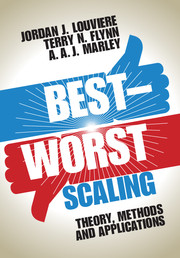Book contents
- Frontmatter
- Contents
- List of figures
- List of tables
- List of contributors to application chapters
- Preface
- Acknowledgments
- Theory and Methods
- Applications: Case 1
- 7 BWS object case application: attitudes towards end-of-life care
- 8 How consumers choose wine: using best-worst scaling across countries
- 9 Best-worst scaling: an alternative to ratings data
- Applications: Case 2
- Applications: Case 3
- References
- Subject index
- Author index
7 - BWS object case application: attitudes towards end-of-life care
from Applications: Case 1
Published online by Cambridge University Press: 05 October 2015
- Frontmatter
- Contents
- List of figures
- List of tables
- List of contributors to application chapters
- Preface
- Acknowledgments
- Theory and Methods
- Applications: Case 1
- 7 BWS object case application: attitudes towards end-of-life care
- 8 How consumers choose wine: using best-worst scaling across countries
- 9 Best-worst scaling: an alternative to ratings data
- Applications: Case 2
- Applications: Case 3
- References
- Subject index
- Author index
Summary
7.1 Introduction
This chapter uses Case 1 – the object case – to elicit the views of older Australians towards different, and potentially competing, end-of-life care strategies. In addition to the empirical aims of the original article, this chapter aims to illustrate to those working in health how Case 1 BWS techniques used previously in personality assessment can be used to elicit attitudes towards health care.The proportion of the Australian population aged 65 and over grew from 8.5 percent in 1961 to 13.3 percent in 2009. This proportion is predicted to rise to 21.3 percent in 2031, which has implications for health and social care service provision, particularly if there are continuing reductions in the proportion of an Australian's life that is spent contributing to the system in tax. This aging issue is common to most of the developed world. Costly, and burdensome, interventions to preserve life are increasingly used. While advances in medical care mean that such highly interventionist strategies return some patients to a health state approximating that experienced before the deterioration, in many cases these treatments serve only to prolong the dying process or return the patient to a highly impaired state in which activities of daily living cannot be performed. Many individuals do not want this expensive and potentially intrusive care (SUPPORT investigators, 1995).
Doctors and family members generally choose interventionist treatment for patients who cannot make their own choice, unless patients make their wishes clear in advance. However, the process of thought leading to the creation of an advance care plan is difficult for most patients (Baker et al., 2013), and only a minority complete plans at present, so clinicians often have little information about an individual patient's treatment preferences.
Advance care planning (ACP) is typically conducted in an interview that is necessarily long and complex, because of the need to consider various medical interventions that might be applied singly, or in combination, in different circumstances. Outcomes can vary, in terms of chance of survival, treatment burden and quality of life. Therefore, traditional ACP interviews have typically been qualitative in nature (Singer, Martin and Kelner, 1999), making them impossible to scale up to the population level.
However, ACP has to be scaled up to this level, not least because end-of-life care is both emotive and resource-intensive to society.
- Type
- Chapter
- Information
- Best-Worst ScalingTheory, Methods and Applications, pp. 149 - 158Publisher: Cambridge University PressPrint publication year: 2015
- 1
- Cited by



